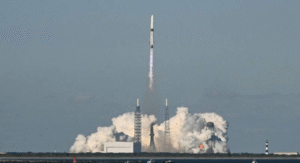Germany Strengthens Space Defence as Concerns Over Russia Grow
Germany has introduced its first national space security strategy, marking a major step toward strengthening both military and civilian capabilities in orbit. The announcement was made by Defence Minister Boris Pistorius, who emphasized the increasing strategic importance of space amid rising geopolitical tensions.
The strategy follows Pistorius’s recent declaration that Germany plans to allocate 35 billion euros toward space-related defence measures by 2030. He cited mounting concerns over Russia and the potential threat from China as key motivations driving the new approach.
Speaking at a press conference in Berlin, Pistorius said Germany must build the capacity to deter and defend against hostile space activities. He stressed that Russia and China are deeply active in outer space, with both countries positioning themselves in ways that could potentially interfere with satellites belonging to Europe and the United States.
Pistorius acknowledged that Germany alone cannot match the rapid advancements of these powers. However, he stated that European NATO members can work collectively to ensure they remain capable of defending their critical space assets.
The new strategy is part of a broader European push to gain greater independence and resilience in space. The European Space Agency is already preparing to launch IRIS2, a large-scale satellite constellation expected by 2030. Additionally, in October, leading European aerospace companies announced plans to merge satellite capabilities to form a strong competitor to SpaceX and the Starlink network.
Germany highlighted the vital role satellites play in communication, navigation, internet access and weather monitoring. These systems also have significant military relevance, and their vulnerability has been demonstrated before. Pistorius recalled that a cyberattack on satellites at the start of Russia’s full-scale invasion of Ukraine led to the shutdown of hundreds of wind turbines in Germany.
The minister warned that a successful strike on satellite systems could cripple a nation’s functionality, reinforcing why Europe must take its space security seriously. Although Germany does not intend to adopt an offensive posture in space, Pistorius stated that having the capability to respond to any attack is essential for deterrence.

The space security framework also promotes peaceful and sustainable use of space, aiming to prevent an arms race while encouraging international cooperation. Germany will participate in joint European efforts including reusable rockets, enhanced launch capability and collaborative space missions.
Dorothee Baer, the minister responsible for space and research, added that the strategy includes programmes for asteroid defence and initiatives to tackle the growing issue of space debris.
As Germany moves forward with these plans, the country aims to secure a stable, rules-based space environment while preparing to confront emerging threats in an increasingly contested domain.













